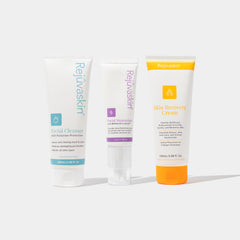Living with eczema goes beyond managing itchy, inflamed skin. For many, the condition brings emotional challenges that impact mental health, confidence, and overall quality of life. If you or someone you love is navigating the emotional toll of eczema, this guide offers insights and actionable solutions for finding relief.
How Eczema Impacts Mental Health
Eczema is not just skin deep. Studies show a strong connection between eczema and mental health challenges, such as anxiety and depression. Understanding this connection is the first step in managing its emotional impact.
-
Stress and Flare-Ups
Stress can worsen eczema symptoms, creating a cycle where flare-ups increase stress, and stress aggravates flare-ups. Psychological stress triggers the release of inflammatory compounds in the skin, worsening itchiness and redness (Harter et al., 2020). -
Confidence and Body Image
Visible eczema patches, especially on the face or hands, often lead to feelings of embarrassment or shame. Many individuals report avoiding social situations or hiding affected areas due to fear of judgment (Rocholl et al., 2021). -
Anxiety and Depression
Eczema sufferers are 63% more likely to experience anxiety or depression compared to those without the condition. This link highlights the importance of addressing mental health as part of a holistic eczema care routine (Long etal., 2022).
Coping Strategies for the Emotional Toll of Eczema
Here are practical tips to help manage the emotional impact of eczema:
1. Prioritize Skincare
Effective skincare can reduce flare-ups and boost confidence. Rejuvaskin’s Skin Recovery Cream provides soothing hydration to calm irritated skin and restore the skin barrier. Incorporating eczema-safe products helps manage symptoms and minimize emotional distress.
2. Practice Stress Management
Techniques like mindfulness meditation, yoga, and breathing exercises can reduce stress, lowering the frequency of flare-ups. Even 10 minutes of daily mindfulness can make a difference.
3. Seek Professional Support
Don’t hesitate to talk to a therapist or counselor about the emotional challenges of eczema. Cognitive Behavioral Therapy (CBT) has been shown to help individuals cope with anxiety, depression, and stress related to chronic skin conditions (Parisapogu et al., 2022).
4. Build a Support System
Connect with others who understand what you’re going through. Online forums and local support groups can offer encouragement, tips, and a sense of community.
5. Create a Skin-Friendly Environment
Avoid triggers like harsh soaps, fragrances, and allergens. Using gentle, eczema-safe products such as Rejuvaskin’s Hydrating Facial Cleanser can protect sensitive skin while reducing irritants.
A Holistic Approach to Healing
Eczema requires care that addresses both the physical and emotional aspects of the condition. Combining an effective skincare routine with mental health support creates a foundation for improved quality of life.
- Hydrate Daily: Keep skin moisturized with products designed for eczema-prone skin, such as Rejuvaskin’s Revita-D Facial Moisturizer.
- Practice Self-Compassion: Remind yourself that eczema doesn’t define your worth or beauty.
- Focus on Progress, Not Perfection: Healing takes time, and small victories—like fewer flare-ups or increased confidence—deserve celebration.
Why Choose Rejuvaskin for Eczema Care?
At Rejuvaskin, we understand the physical and emotional challenges of living with eczema. Our products are dermatologist-recommended, safe for sensitive skin, and designed to calm irritation while supporting long-term skin health. Explore our full range of eczema-safe solutions here.
Eczema may be a chronic condition, but it doesn’t have to control your emotional well-being. With the right strategies, support, and skincare, you can manage the physical and mental challenges of eczema, building confidence and reclaiming your quality of life.
Works Cited
- Harter, K., Hammel, G., Kirchberger, I., et al. (2020). Social and psychosocial effects on atopic eczema symptom severity – a scoping review. Journal of the European Academy of Dermatology and Venereology. Link
- Long, Q., Jin, H., You, X., et al. (2022). Eczema is a shared risk factor for anxiety and depression: A meta-analysis and systematic review. PLoS ONE. Link
- Rocholl, M., Ludewig, M., Brakemeier, C., et al. (2021). Illness perceptions of adults with eczematous skin diseases: A systematic mixed studies review. Systematic Reviews. Link
- Parisapogu, A., Ojinna, B. T., et al. (2022). A Molecular Basis Approach of Eczema and Its Link to Depression and Related Neuropsychiatric Outcomes. Cureus. Link
- Trending Keywords and Insights:
- Primary Keywords:
- emotional impact of eczema
- eczema and mental health
- coping with eczema anxiety/depression
- eczema and self-esteem/confidence
- Long-Tail Keywords:
- best ways to manage stress with eczema
- how to deal with social anxiety due to eczema
- building self-compassion with eczema
- eczema support groups online/local
- natural remedies for eczema itch relief





















Leave a comment